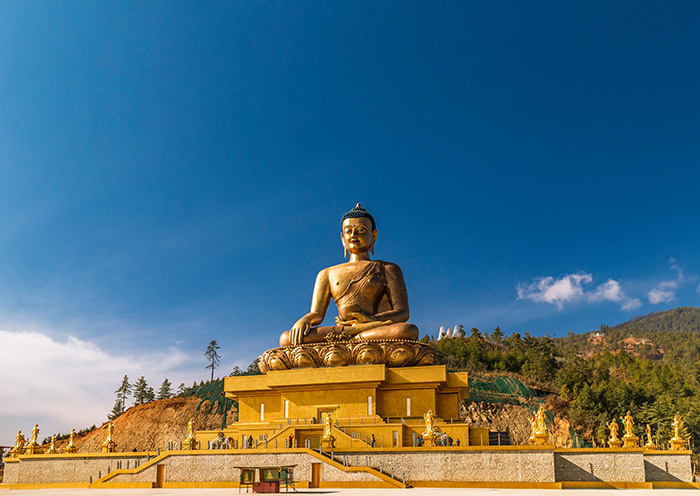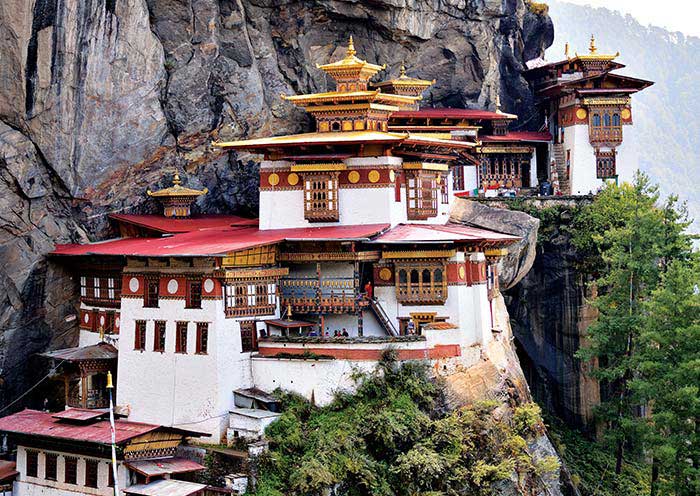Bhutan Highlight Tour 6Days
- See More
- Route:Paro-Thimphu-Punakha-Paro
- Group Size:1-6 pax
- Tour Guide:English-speaking guide
- Meals:5Breakfasts;4Lunches;5Dinners
- Accommodations:5Nights,3-Star hotels
- Single Supplement:USD200/Pax
- Tour style:
Bhutan Cultural Tour
From:USD1460
109 Pax Booked
Highlights:
- 1. Relax via Bhutan's traditional hot stone bath
- 2. Drink traditional red rice beer with a unique local taste
- 3. Dress in Bhutan National Attire (Gho or Kira) to take photos
- 4. Get 1 Bhutan sim card with 5GB internet access
- 5. Welcome dinner with Bhutan Culture Dance Show in Paro
- 6. Have dinner in Folk Heritage Museum (based on the group over 5Pax)
- 7. Try local archery which is not only Bhutan's national sport but also art
Tashi Delek and welcome to Bhutan. Our local representative will greet you at the only international airport in Bhutan that is located in Paro(2262m), Western Bhutan. Then check in at your sweet hotel for a good rest while getting used to the time difference. Enjoy the welcome dinner with the Bhutan culture dance show.
Meals: Dinner
Accommodation:Paro
- Bhutan Architecture
- Paro Dzong
In the morning, we will head to Bhutan’s capital city Thimphu (72km, about 2.5h) via a visit to Tamchog Lhakhang on the way. After sightseeing in Thimphu (2360m) with Buddha Dordenma Statue, National Memorial Chorten, Motithang Takin Preserve, and Tashichho Dzong, we will have dinner in the Folk Heritage Museum. Then have a good rest in your hotel.
Tamchog Lhakhang (Tachog Lhakhang) is located by the Paro river on the way to Thimphu from Paro. To get to the temple we must walk across a unique iron chain bridge with colorful fluttering prayer flags. Both the Lhakhang and the iron bridge are built by the saint Thangthong Gyalpo (1385-1464, Tibetan polymath). As the "King of the Empty Plain", Thangthong Gyalpo is now commonly known as the "Iron Bridge Maker". Enjoy his pioneering old-aged buildings left till today.
Buddha Dordenma Statue (Kuenselphodrang, Buddha Point) is a landmark of Thimphu city and you can have a great view of the Thimphu Valley there. With 51.5m in height, built of bronze and gilded in gold, the statue is famed as the largest sitting Shakyamuni statue in the world and there are 125,000 smaller Buddha statues placed within it. The statue was finished in 2015(built for 9years) to fulfill an ancient prophecy to emanate an aura of happiness and peace all over the world.
National Memorial Chorten is the most visited landmark of Thimphu which was built in 1974 in memory of the Third King, His Majesty Jigme Dorji Wangchuk(the Father of Modern Bhutan) by his mother. Due to the idea of Jigme Dorji, this stupa is dedicated to world peace and prosperity. It is a Tibetan-style chorten with amazing paintings and brilliant sculptures, you can see the classical stupa pattern like the pyramidal pillar crowned by a crescent moon and sun. It is also a good place to meet local Bhutanese people circumambulating the Chorten throughout the day in a clockwise direction for praying.
Tashichho Dzong (Thimphu Dzong) is located on the right side of the Wangchu River in the northern part of Thimphu city. As the "Fortress of the glorious religion", it houses the throne room of His Majesty the King, government offices, and the central monk body. Thimphu Dzong was initially erected in 1641 and rebuilt by King Jigme Dorji Wangchuck in the 1960s. There are two main entrances in the Tashichho Dzong. One leads to the administrative section to the south and the other one (at the north) leads to the monastic quarter where festivals and dances are performed.
Motithang Takin Preserve (Takin Zoo) is a wildlife reserve for Takin (Budorcas taxicolor), the national animal of Bhutan. Drukpa Kunley (Divine Madman), the famous Tibetan saint, is said to be responsible for the creation of Takin which has the head of a goat and the body of a cow.
Folk Heritage Museum (Phelchey Toenkhyim) was established on July 28th, 2001 with the initiative of Her Majesty Ashi Dorji Wangmo Wangchuck (the Queen Mother of Bhutan). It is set inside a three-storied, 19th-century traditional house and provides visitors with a glimpse of the traditional Bhutanese lifestyle, artifacts from rural households, collection of typical household objects, tools, and equipment. The museum also organizes regular demonstrations of rural traditions, skills, habits, and customs as well as hosts educational programs for children.
Meals:Breakfast Lunch Dinner
Accommodation:Thimphu
- Tamchog Lhakhang Iron Bridge
- Tashichho Dzong, Thimphu
This morning we will drive to Punakha (74KM, about 2.5hrs) via Dochula pass, Punakha Dzong, and Chimi Lhakhang. In Punakha (1310m) we can take a hike in Limbukha Village. If your visit to Thimphu coincides with the weekend (Friday to Sunday), we will walk through the Thimphu Market to see the variety of food of Bhutan, including basket upon basket of fiery chilies, fresh cheese and a variety of fresh greens. In addition, many stalls contain Bhutanese handicrafts and household items.
Dochula Pass (108 memorial chortens) is a place in honor of 108 Bhutanese Soldiers, there are 108 stupas called the "Druk Wangyal Chortens" representing each soldier's life that was lost in the war of December 2003. The pass is decorated with colorful prayer flags which are symbols of veneration and the best wishes for peace and prosperity for Bhutan. If the weather is good, the Dochula Pass will become the best platform to get breathtaking views of the snow-covered Himalayas.
Punakha Dzong stands at the junction of two great rivers called the Pho Chu river (father river) and Mo Chu river (mother river). As the palace of great happiness or bliss, it is also known as the most beautiful Dzong in Bhutan. It was first built in 1637 by the founder of Bhutan, Shabdrung Ngawang Namgyel, and was played as the administrative center and the seat of the Bhutanese official till the capital city was moved from Punakha to Thimphu in 1955. Now, this Dzong is served as the winter residence for Je Khenpo, Chief Abbot of the Central Monastic Body. In 2011, the Dzong witnessed the royal wedding ceremony of the 5th Bhutan's King, His Majesty Jigme Namgyel Wangchuck to Queen Jetsun Pema. If you visit Bhutan in May, you will be amazed by the breathtaking purple-blue jacaranda blooms outside the fortress.
Chimi Lhakhang (Fertility Temple, Chime Lhakhang) is located on a hillock among the rice field and is a pilgrimage for a childless couple to seek blessings. The monk there blesses the couple with a wooden phallus that is believed to have the power to help the childless couple conceive a child. This temple is associated with the famous Drukpa Kunley (1455-1529, Divine Madman, Tibetan saint), who is famed for using his phallus to guide people to enlightenment and subdue demons. That is why you can see the symbol of phalluses scattered everywhere. You can buy handicraft souvenirs here with the phallic symbol in various colors, shapes, and sizes.
Limbukha Village is known for its love of peace and tranquility. During the annual festival, the Limbuk men are found carrying peace flags instead of swords and fireworks. We can walk along its red rice fields and have an idea about Bhutan's famous red rice which is supposed to have medicinal value. Also, you may meet local farmers in their tradition Gho or Kira working in the field with a pure smile on their face.
Meals:Breakfast Lunch Dinner
Accommodation:Punakha
- Dochula Pass
- Punakha Dzong
Today it is time for us to drive back to Paro from Punakha (115km, about 2.5h), after check-in at the hotel in Paro you can have a rest. In the afternoon, experience the national game of Bhutan: Archery time in Paro Dzongkhag Archery Ground.
Bhutan Archery is the favorite pastime for Bhutanese. It has a history of over two thousand years and was declared Bhutan's National Sport in 1971. Every town and village has its full-length archery field and teams of archers. The traditional Bhutanese archery equipment is a long bamboo bow. Now most archers use a state-of-the-art carbonite Hoyt brand bow. A compound bow made of fiberglass and pulleys can cost between 50,000 to 100,000 Nu (about 1250USD). Targets at traditional Bhutanese tournaments are placed at both ends of a 140m range (Olympic distance is 70m). Enjoy your Archery time by holding a bow and arrow.
Meals:Breakfast Lunch Dinner
Accommodation:Paro
- Bhutan Archery
- Paro Rice Field Autumn
Today we will drive from Paro city to the start point of the hiking route of the Tiger's Nest Monastery. It takes about 2.5 hours to reach Tiger's Nest by foot (5 hours for a round trip), and you can have a rest at the view terrace which is located at the halfway point of the hiking road. Also, you can choose to ride a horse(self-paying) from the camp base to the Taktsang Cafeteria (lunch spot). Complimentary Bhutan’s traditional hot stone bath after sightseeing.
Tiger's Nest Monastery (Taktsang Goemba, Takhtsang Lakhang, Paro Taktshang), first built in 1692, is the iconic landmark of Bhutan. As a world cultural heritage, it is sited on the side of a cliff at a height of 900m above the Paro valley. It is said that Guru Rinpoche (a Buddhist saint) rode a tigress to the current site of the monastery and meditated in a cave for 3 years 3 months and 3 days. Now it is one of the most visited tourist attractions in Bhutan and a sacred religious site for Bhutanese to pilgrimage at least once in a lifetime.
Complimentary Bhutan Traditional Hot Stone Bath in the late afternoon. A visit to Bhutan without enjoying the health benefits hot stone bath would be incomplete. After the hiking, a traditional Bhutanese hot stone bath is perfect to relax in the water heated by hot river stones roasted on the fire.
Meals:Breakfast Lunch Dinner
Accommodation:Paro
- Tiger's Nest, Paro
- Hike sticks on the way to Tigers Nest
Time to say goodbye to Bhutan, the beautiful Himalayan country. Our local representative will meet you at your hotel and send you to the international airport. Happiness is a place, wish you get happiness and great memories from the Bhutantrip with us. We look forward to seeing you again, Tashi Delek!
Note:Please note that some of the sites in the itinerary may change due to season, weather, national holidays, and special events. We maintain the right to alter the itinerary. The changes in itinerary will mainly base on improving your tour experience in Bhutan.
Meals:Breakfast
Accommodation:/
- Rinpung Dzong, Paro
- Thank you for choosing us.
Price Includes
- 1.Meals listed in the itinerary
- 2.Accommodation in 3-star hotel under twin/dbl bed sharing basis
- 3.All transportation within the country including airport transfers
- 4.English-speaking local guide
- 5.Entrance fees for Museums and Monuments
- 6.Bhutan SDF fee
- 7.Bhutan Visa fee: USD 40 per person
- 8.Bhutan Hot Stone Bath in Paro
- 9.Archery time in Paro Dzongkhag Archery Ground
Price Excludes
- ✖1.Single room supplement charges (USD 40 per person per night for 3-star hotels)
- ✖2.International flights before and after the tour
- ✖3.Personal expense and Travel Insurance
- ✖4.Cost for any services not mentioned in the "PRICE INCLUDES"





























